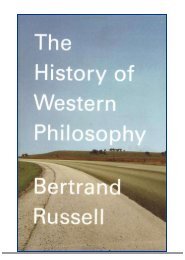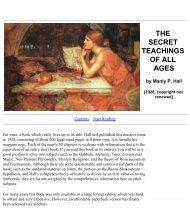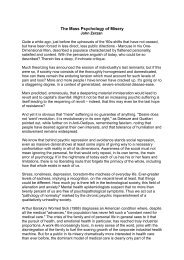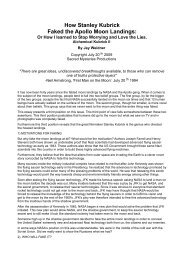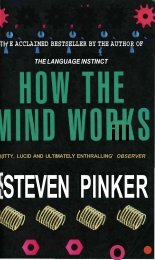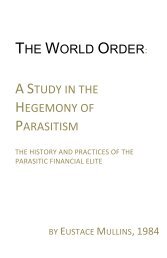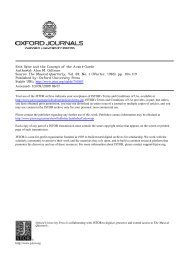The Ever-Present Origin - Michael Goodnight - Editor
The Ever-Present Origin - Michael Goodnight - Editor
The Ever-Present Origin - Michael Goodnight - Editor
- No tags were found...
You also want an ePaper? Increase the reach of your titles
YUMPU automatically turns print PDFs into web optimized ePapers that Google loves.
While plumbing the hidden depths of the word roots, we will have to beconstantly mindful of connections forgotten by contemporary man. Anyattempt to probe this region is likely to unleash a negative reaction inpresent-day man, since such insights into the shadowy depth areunsettling; they remind him too much of the dark depths which he doesnot yet dare to acknowledge in himself. Yet it is perfectly permissibletoday, and to some degree indispensible, to think symbolical whiledescribing symbolic processes. If we insist an such symbolic thinking,however, one precept must be observed: as far as possible we mustpossess an insight into the particular symbol; that is, we must be certainand aware of the symbolism involved. If we are not, we lose our selfassuranceand become victims of the symbol, captive to an unknownpower that controls us according to its will. We would expressly warn hereof such psychic violation by the symbol, as well as of the psychic bondagethat results from an inadequate awareness and knowledge of symbolicthinking.Let us, however, return to the question of perspectivity. We have notedthat perspective is the pre-eminent expression of the emergentconsciousness of fifteenth-century European man, the palpable expressionof hisobjectivation of spatial awareness. Besides illuminating space,perspective brings it to man's awareness and lends man his own visibilityof himself. We have also noted that in the paintings of Giotto and Masacciothis evident perception of man comes to light for the first time. Yet thisvery same perspective whose study and gradual acquisition were a majorpreoccupation for Renaissance man not only extends his image of theworld achieving spatialization but also narrows his vision - a consequencethat still afflicts us today.Perspectival vision and thought confine us within spatial limitations.Elsewhere we have alluded to the antithesis inherent in perspective: itlocates and determines the observer as well as the observed. <strong>The</strong> positiveresult is a concretion of man and space; the negative result is therestriction of man to a limited segment where he perceives only onesector of reality. Like Petrarch, who separated landscape from land, manseparates from the whole only that part which his view or thinking canencompass, and forgets those sectors that lie adjacent, beyond, or evenbehind. One result is the anthropocentrism that has displaced what wemight call the theocentrism previously held. Man, himself a part of theworld, endows his sector of awareness with primacy; but he is, of course,only able to perceive a partial view. <strong>The</strong> sector is given prominence overthe circle; the part outweighs the whole. As the whole cannot beapproached from a perspectival attitude to the world, we merelysuperimpose the character of wholeness onto the sector, the result beingthe familiar "totality."It is no accident that the ambivalence inherent in the (Latin) primal wordtotusis evident in the word "totality." Although in more recent times theword totushasmeant "all" or "whole," it would earlier have meant"nothing." In any event, theaudial similarity between totus and [German]20




